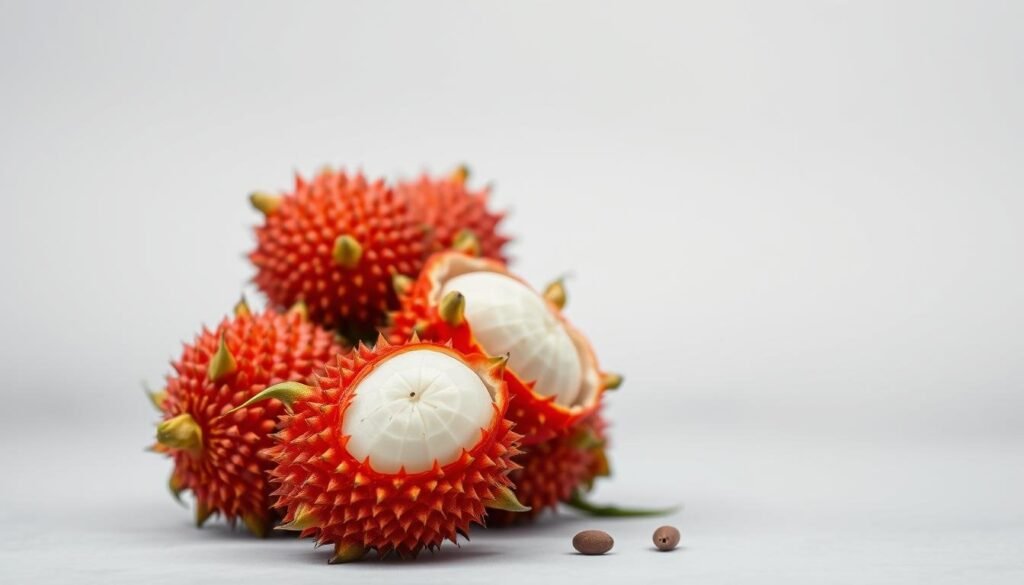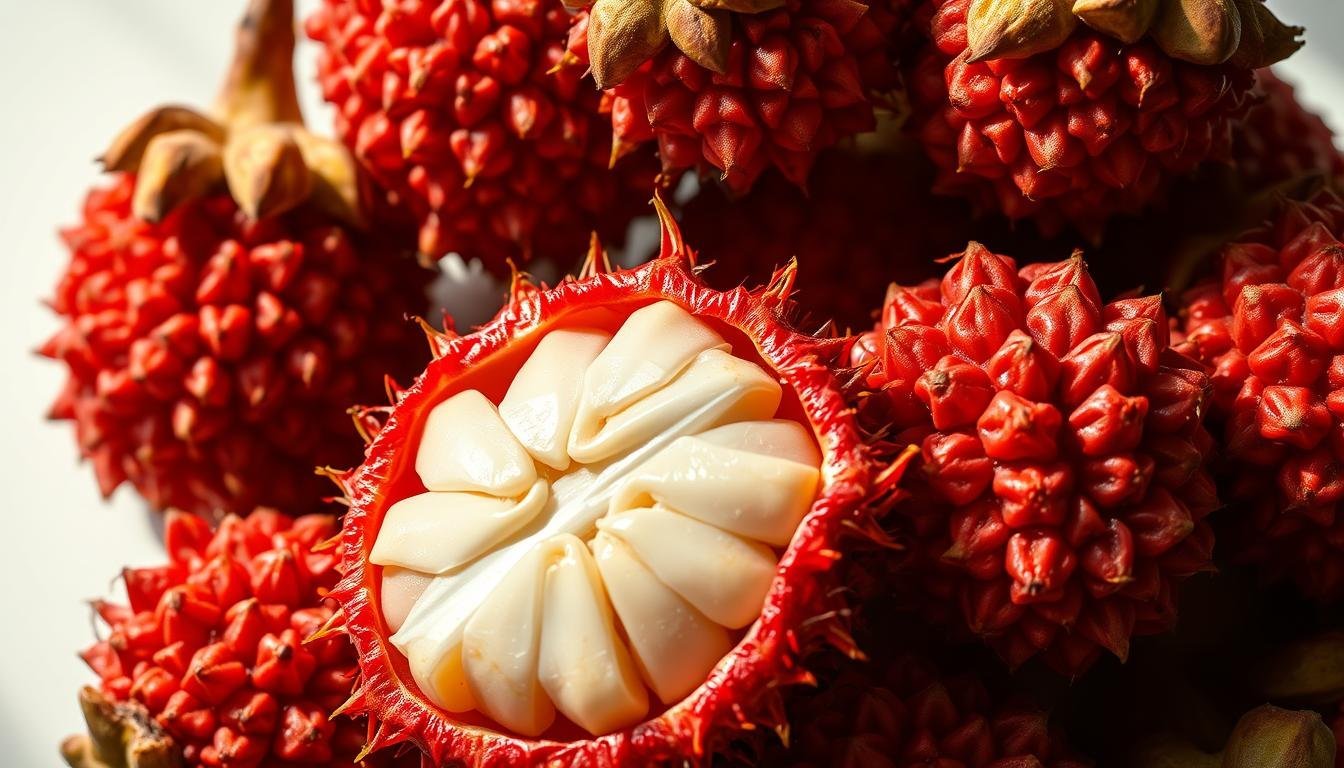Last updated on August 21st, 2025 at 02:45 pm
Can You Eat the Seeds of Rambutan? Rambutan is a tropical fruit from Southeast Asia. It’s known for its unique look and taste. You might wonder if you can eat its seeds.
The rambutan fruit tastes sweet and a bit sour. But its seeds, hidden in a hard shell, are less known. Some fruits have seeds you can eat, while others are not safe.
It’s important to know if rambutan seeds are safe to eat. This way, you can enjoy the fruit without worrying about your health. This article will tell you if rambutan seeds are edible and what they can be used for.
Contents
- 1 What Is Rambutan?
- 2 Rambutan Varieties
- 3 Can You Eat the Seeds of Rambutan?
- 4 Nutritional Profile and Potential Benefits
- 5 How to Prepare and Use Rambutan Seeds
- 6 Conclusion: Can You Eat the Seeds of Rambutan?
- 7 FAQ
- 7.1 Are rambutan seeds safe to eat?
- 7.2 How do you prepare rambutan seeds for consumption?
- 7.3 What are the potential health benefits of eating rambutan seeds?
- 7.4 Can rambutan seeds be used in cooking and baking?
- 7.5 Are there any specific allergens or risks associated with consuming rambutan seeds?
- 7.6 Can children and pregnant women safely consume rambutan seeds?
What Is Rambutan?
The rambutan fruit comes from Southeast Asia and shows nature’s amazing variety. You might have seen it in local markets or grocery stores. Its unique look often makes people curious.
Rambutan belongs to the Sapindaceae family. This family also includes fruits like lychee and longan.
Rambutan has a hairy, red or yellow skin. This is why it’s called rambutan, from the Malay word “rambut,” meaning hair. Inside, you’ll find a sweet pulp and a single seed.
The pulp is the tasty part. People enjoy it fresh or in desserts and drinks.
Rambutan Varieties
There are many rambutan varieties, each with its own traits. Some well-known ones are:
- R161: Known for its large size and sweet flavor.
- Seeding Rongrien: A variety from Thailand, appreciated for its aromatic pulp.
- Rambutan Binjai: Originating from Malaysia, it’s cherished for its tender flesh.
These varieties differ in taste and look. Some have a brighter red color than others. Knowing about these varieties can make you appreciate rambutan more.
Can You Eat the Seeds of Rambutan?
Many people wonder if rambutan seeds are safe to eat. Rambutan is a fruit known for its unique look and taste. But, are its seeds okay to consume?
Rambutan seeds have compounds that might be good or bad for you. Scientists are still studying if these seeds are safe to eat. It’s important to know the risks before eating them.
Eating rambutan seeds can be risky. Some people might be allergic to certain compounds in the seeds. This could lead to allergic reactions. Also, the seeds have saponins, which can upset your stomach if you eat too much.
- Allergic reactions to saponins or other compounds
- Gastrointestinal issues due to saponin consumption
- Potential toxicity from certain seed compounds
To stay safe, it’s best not to eat rambutan seeds until more research is done. If you’re thinking about eating them, talk to a doctor or a nutritionist. They can help you understand the risks and benefits.
In short, while rambutan flesh is good for you, its seeds need more study. Until then, it’s safer to avoid eating them.
Nutritional Profile and Potential Benefits
Rambutan seeds are packed with nutrients that can boost your health. They are full of vitamins, minerals, and antioxidants. These help keep you healthy and feeling good.
The seeds are high in fiber, which is great for your digestion. They also have a lot of protein. This makes them a key part of a healthy diet.

Eating rambutan seeds can bring many health benefits. Here are some of the main advantages:
- Improved digestion: The seeds’ fiber helps keep your bowels regular and prevents constipation.
- Antioxidant properties: They contain antioxidants that fight off free radicals. This may lower the risk of chronic diseases.
- Enhanced nutrition: The seeds are rich in vitamins and minerals. They add to your overall nutrition.
Rambutan seeds also have antioxidants and nutrients that fight inflammation. They support your immune system. Adding them to your meals can increase your nutrient intake.
To get the most from rambutan seeds, you need to prepare them right. The right preparation unlocks their full nutritional benefits.
How to Prepare and Use Rambutan Seeds
Learning to prepare rambutan seeds can enhance your cooking. These seeds are not only edible but also add a special flavor and nutrients to your dishes. First, remove the seed from the fruit, wash it, and then choose how to prepare it.
There are a few ways to prepare rambutan seeds. You can roast them to enhance their taste or boil them to soften them. Roasting means baking the seeds at a moderate heat until they’re lightly browned. Boiling involves cooking the seeds in water until they’re tender.
Rambutan seeds can be used in many dishes, from savory to sweet. Here are some ideas to begin with:
- Add roasted rambutan seeds to salads for a crunchy texture.
- Use boiled rambutan seeds in soups or stews.
- Grind roasted seeds into a flour for baking.
Try this simple recipe:
| Recipe | Ingredients | Instructions |
|---|---|---|
| Rambutan Seed Salad Topper | 1 cup roasted rambutan seeds, 1/2 cup chopped fresh herbs, 1 tablespoon olive oil, Salt to taste | Mix all ingredients together and sprinkle over your favorite salad. |
| Rambutan Seed Soup | 1 cup boiled rambutan seeds, 4 cups vegetable broth, 1/2 cup diced vegetables, 1 teaspoon spice blend | Combine all ingredients in a pot and simmer until the vegetables are tender. |
Exploring rambutan seeds can enrich your cooking. With these easy preparation tips and recipe ideas, you can enjoy their unique taste and health benefits.
Conclusion: Can You Eat the Seeds of Rambutan?
Rambutan seeds are not only safe to eat but also full of good stuff. They have compounds that might help your health. Adding them to your meals can make your diet more interesting.
To make rambutan seeds tasty, roast or boil them. You can also grind them into powder for recipes. This way, you can enjoy their nutritional benefits in your food.
Exploring exotic fruits like rambutan can open up new tastes and ingredients. Rambutan seeds show how a fruit’s part can be useful. Eating them can introduce new flavors and health perks.
See Also: Are Raspberry Seeds Edible? A Closer Look!
FAQ
Are rambutan seeds safe to eat?
Yes, rambutan seeds are safe to eat. But, they might cause allergic reactions or interact with some medicines. Make sure to prepare them right before eating.
How do you prepare rambutan seeds for consumption?
To eat rambutan seeds, roast or boil them. Roasting makes them taste better, while boiling makes them easier to digest. Always remove the seed coat before eating.
What are the potential health benefits of eating rambutan seeds?
Rambutan seeds are full of nutrients like antioxidants. They might help improve your nutrition and prevent diseases. But, more research is needed to know their exact benefits.
Can rambutan seeds be used in cooking and baking?
Yes, you can use rambutan seeds in cooking and baking. You can grind them into flour for baking or add them to savory dishes. Try different ways to find your favorite use for them.
Are there any specific allergens or risks associated with consuming rambutan seeds?
Some people might be allergic to rambutan seeds or have digestive issues after eating them. If you’re trying them for the first time, start with a small amount to see how your body reacts.
Can children and pregnant women safely consume rambutan seeds?
It’s best for children and pregnant women to talk to a doctor before eating rambutan seeds. This is especially true if they have allergies or health issues.

Hello, I am Bellamy George, a certified nutritionist and food safety specialist from Springfield, IL. With a degree in Food Science, I share research-backed insights on edible foods, seeds, and seafood for safe, informed eating.

